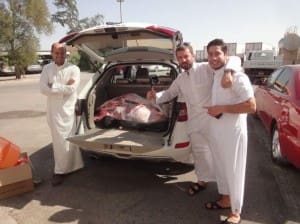A shift towards fresh carcase sales in some Middle Eastern markets has advantages for animal welfare and for a live export industry plagued by images of sheep being trussed, man-handled and home slaughtered during religious festivals overseas.
The Livex Forum in Melbourne last week was told some Middle Eastern market customers during the Eid Al Adha festival this year were prepared to buy a fresh Australian sheep carcase rather than select a live sheep for slaughter at home.
MLA’s livestock exports manager Peter Dundon said the fresh carcase system was limiting leakage and ensuring sheep were slaughtered in ESCAS-approved facilities.
The risks during the Eid Al Adha festival were unsatisfactory animal welfare practices and leakage from the ESCAS system, he said.
“Of course leakage during Eid leads to unsatisfactory animal welfare practices.”
The MLA team, importers and exporters facilitate alternative options to home slaughter of sheep and implement systems that support religious practices, Mr Dundon said.
“We’re increasingly moving from livestock sales to carcase sales.”
Customers buying carcases not live sheep
Mr Dundon said the Middle Eastern markets – Bahrain, Jordan, Kuwait – have had a lot of “animal welfare criticism” about the tying up of Australian and local sheep and transporting them in the boots of cars.
“This was happening all over the region including with Australian sheep and with local sheep.”
Other improvements in ME abattoirs included ramps, table and yards for the movement and handling of sheep. The treatment of sheep had transitioned from transport of live animals in the boots of cars in 2007, to in utilities, buses and the backs of cars from 2008. Now sheep can only go to ESCAS-approved slaughterhouses and some customers are no longer choosing to pick and transport individual sheep, he said.
“You’ve got a whole bunch of keen buyers that are now buying a ticket to buy a carcase, not a live sheep.
“So instead of buying two sheep and putting them in the boots of cars, they are buying two carcases and they are putting them in the back of the ute,” he said.
“This is a massive transformation and you can’t underestimate the significance of this – it has taken us seven years to get to this point.
“It is not just happening in Bahrain, it is also happening in Qatar, it happened at one of the slaughterhouses in Kuwait this year and also in Oman, and everyone is accepting it,” Mr Dundon said.
“It is definitely trending towards this system – (MLAs livestock services manager) David Beattie has done a fantastic job over there – it is not an easy thing to sell.
“It is definitely the way to go – it largely avoids leakage in the tighter supply chains – and you don’t have all the trouble of handling and people wanting to select the sheep.”
Move to chilled carcase sales not likely in short-term
Mr Beatty said the ME market religious festival requirements were still for livestock to be slaughtered fresh rather than accepting chilled product, but he hoped the fresh slaughter sales would be expanded to more facilities.
The “subtle shift” was that instead of people after their first prayers on the first day of Eid wanting to go to a livestock market or an abattoir to select livestock individually, they are buying a freshly slaughter carcase at an abattoir, he said.
“The shift has been to convince people that you will still get an Australian animal and it will still be slaughter during Eid but instead of having to choose it and put the ear tag on and getting it mixed up – and it is an absolute circus at the collection area – you can just buy a ticket and move around and pick up your carcase.
“So I don’t think we will, in the short-term, get to a point where you will be selling chilled carcases during Eid, but this is such an achievement.
“Three or four years ago there was literally no chance that you could do this,” he said.
“In a couple of facilities they have been saying they would do the same for local sheep next year.
“Societies are changing and they want fast food and they want things quickly and that’s the same in the Middle East,” Mr Beatty said.
“I think if the facilities market it and the word spreads that you can turn up at six or seven o’clock in the morning during Eid and not have to wait long I think people will move towards that.
“Those facilities will hopefully grow their volumes and then others will follow.”



HAVE YOUR SAY